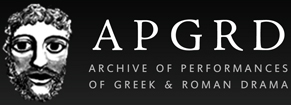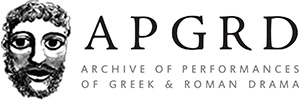To see the results of the programme, please see the projects showcase
The second CAGR programme ran from 2012 to 2014 and built on the success of the first CAGR programme, which ran from 2010 to 2012. For a second time, the programme was generously funded by the AHRC and organized by Oxford University’s Archive of Performances of Greek and Roman Drama (APGRD).
The first CAGR programme focused on sharing a range of skills with researchers that are integral to public engagement activities. Informed by participant feedback, the second programme took the next step in helping researchers build sustainable partnerships with organizations in the media, arts and heritage, and education sectors by awarding each participant £2,000 for their projects.
Participants again worked closely with experts and professionals in a series of interactive sessions to explore the creative potential for making research on ancient Greece and Rome accessible and relevant to a variety of audiences. The sessions, in most cases, included a visit to a partner organization to see it in operation. Participants also had the chance to learn from CAGR alumni.
In addition to these interactive sessions, participants worked directly with a professional partner to design and deliver a high-quality public programme. Participants’ travel expenses to the relevant venues were also fully reimbursed for the duration of the programme.
Schedule of Sessions
Popular writing and publishing - 15 April 2013, Oxford
Charlotte Higgins (Lead Arts Feature Writer, The Guardian) explored the principles of writing concise, accessible articles for newspapers, popular journals, and popular non-fiction, and managing a public-facing but academically-based reputation. Charlotte Loveridge (Commissioning Editor, Classics, Bloomsbury) and Marina Kemp (Assistant Commissioning Editor, Penguin Classics) offered insights into popular and academic writing from the perspectives of the publishing industry.
Broadcast media - 21 June 2013, Oxford
Bettany Hughes (Freelance Writer and TV Presenter) explored the principles of preparing and presenting academically-based TV shows for a popular audience. Beaty Rubens (BBC Radio producer) and Caroline Finnegan (BBC TV and Radio producer) offered insight into approaching producers with ideas for new programmes drawing on academic research. An optional tour of the BBC was arranged on an alternative day.
Libraries and archives - 7 October 2013, London
Teresa Doherty (former Head of Collections, The Women’s Library), Gavin Clarke (Archivist, National Theatre) and Michelle Paull (academic and former Modern Literary Manuscripts Curator) explored the possibilities of communicating research to a variety of audiences by working in partnership with libraries and archives.
Historic Houses - 9 December 2013, Derby
Simon McCormack (Conservation Manager, National Trust) and Danielle Westerhof (Freelance Rare Books Cataloguer and Historian) explored the possibilities for communicating research to a variety of audiences by working in partnership with historic houses.
Museums - 17 January 2014, London
Debbie Challis (Audience Development Officer, Petrie Museum) explored the inter-relationships between academics and museum professionals, and the ways in which different audiences benefit from museum collections. Hallie Marshall (APGRD Postdoctoral Research Fellow) offered insight into the role of the academic in interpreting the museum collection for the public.
Schools - 17 April 2014, Oxford
Bob Lister (Faculty of Education, University of Cambridge) explored the practical and creative considerations of working with schools and communicating effectively with young people. Mai Musié (Classics Outreach Officer, University of Oxford) offered insight into delivering Classics-related programmes on a professional level and the important contributions that academics can make.
Creative Industries - 20 June 2014, Birmingham
Professionals at the Birmingham Repertory Theatre explored the role of the academic in producing creative work and fostering creative engagement with research for the public. The day was led by Struan Leslie with contributions from Roxana Silbert (Artistic Director, Birmingham Rep), Steve Ball (Associate Director, Birmingham Rep) and Tessa Walker (Associate Director, Birmingham Rep), as well as Marie-Louise Crawley (freelance choreographer and dance artist) and Helen Eastman (freelance theatre director).
Discussion panel - 3 October 2014, Oxford
Discussion panel with David Watson (Principal Green Templeton College - The Engaged University (2011), The Question of Conscience: higher education and personal responsibility, 2013), Abigail Williams (Tutor in English, St Peter's College and Knowledge Exchange Fellow, Humanities Division, Oxford), Sam Sneddon (Assistant Registrar Research, Social Sciences Division), Steven Hill (Head of Policy, HEFCE, former head of strategy at Research Councils UK), and CAGR alumni. This was also a ‘touching-base’ session where programme participants had the opportunity to talk individually with CAGR alumni and programme organisers about ongoing or potential partnership projects.
Presentation of partnership projects - 15 December 2014, Oxford
Programme participants shared with the group what they have been working on with their professional partners. Guest Respondent: Paul Cartledge (A G Leventis Emeritus Professor of Greek Culture, University of Cambridge).
To see the results of the programme, please see the projects showcase


